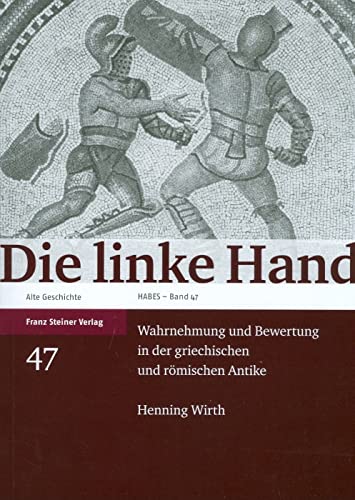Items related to Die Linke Hand: Wahrnehmung Und Bewertung In der Griechische...
Die Linke Hand: Wahrnehmung Und Bewertung In der Griechischen Und Romischen Antike: 47 (Heidelberger Althistorische Beitrage Und Epigraphische Studien) - Softcover

Synopsis
English summary: Human perception includes the division of space into left and right. In general, left holds a negative connotation: A clumsy man appears linkisch in German, links meaning left, and the term translates as awkward. If you conned him, he has been gelinkt. For a long time this negative coloring was also closely associated with the image of left-handers: Left-handers were often regarded as disabled, appeared awkward and antisocial, and were exposed to discrimination. To understand the people of ancient Greece and Rome, one must understand the role right and left played in their perception and evaluation of the world. Henning Wirth studies the following questions from an ancient historical perspective: How did the Greeks and Romans perceive left? What role was provided to the left hand in a dominantly right-handed world, where the right hand attested Godly effectiveness? And how does one explain the phenomenon of left-handedness and assessment of left-handed people? German text.
German description: Zur menschlichen Wahrnehmung gehort die Einteilung des Raumes in links und rechts. Dabei ist links in der Regel negativ konnotiert: Ein ungeschickter Mensch erscheint alinkisch. Hat man ihn betrogen, so hat man ihn agelinkt. Lange Zeit war diese Negativfarbung auch eng mit dem Bild ueber Linkshander verknuepft: Linkshander galten oftmals als behindert, erschienen asozial und ungeschickt und waren Diskriminierungen ausgesetzt. Will man den Menschen der griechischen und romischen Antike verstehen, muss man nachvollziehen, welche Rolle rechts und links in seiner Wahrnehmung und Bewertung der Welt spielten. Aus althistorischer Perspektive untersucht Henning Wirth hier folgende Fragen: Welche Vorstellungen besassen Griechen und Romer von links' Welche Rolle war in einer mehrheitlich aus Rechtshandern bestehenden Welt, in der der rechten Hand gottliche Wirkkraft attestiert wurde, fuer die linke Hand vorgesehen' Und wie erklarte man sich das Phanomen der Linkshandigkeit und bewertete linkshandige Menschen'
"synopsis" may belong to another edition of this title.
- PublisherFranz Steiner Verlag Wiesbaden GmbH
- Publication date2010
- ISBN 10 3515094490
- ISBN 13 9783515094498
- BindingPaperback
- LanguageGerman
- Number of pages271
FREE shipping within U.S.A.
Destination, rates & speedsSearch results for Die Linke Hand: Wahrnehmung Und Bewertung In der Griechische...
Die Linke Hand: Wahrnehmung Und Bewertung In der Griechischen Und Romischen Antike
Seller: ThriftBooks-Dallas, Dallas, TX, U.S.A.
Paperback. Condition: Very Good. No Jacket. May have limited writing in cover pages. Pages are unmarked. ~ ThriftBooks: Read More, Spend Less 1.1. Seller Inventory # G3515094490I4N00
Quantity: 1 available
DIE LINKE HAND Wahrnehmung Und Bewertung in Der Griechischen Und Römischen Antike
Seller: Ancient World Books, Toronto, ON, Canada
Softcover. Condition: Near Fine. Very light rubbing else Fine. ; Heidelberger Althistorische Beitrage Und Epigraphische Studien Band 47; Vol. 47; 283 pages; English summary: Human perception includes the division of space into left and right. In general, left holds a negative connotation: A clumsy man appears linkisch in German, links meaning left, and the term translates as awkward. If you conned him, he has been gelinkt. For a long time this negative coloring was also closely associated with the image of left-handers: Left-handers were often regarded as disabled, appeared awkward and antisocial, and were exposed to discrimination. To understand the people of ancient Greece and Rome, one must understand the role right and left played in their perception and evaluation of the world. Henning Wirth studies the following questions from an ancient historical perspective: How did the Greeks and Romans perceive left? What role was provided to the left hand in a dominantly right-handed world, where the right hand attested Godly effectiveness? And how does one explain the phenomenon of left-handedness and assessment of left-handed people? German text. German description: Zur menschlichen Wahrnehmung gehort die Einteilung des Raumes in links und rechts. Dabei ist links in der Regel negativ konnotiert: Ein ungeschickter Mensch erscheint alinkisch. Hat man ihn betrogen, so hat man ihn agelinkt. Lange Zeit war diese Negativfarbung auch eng mit dem Bild uber Linkshander verknupft: Linkshander galten oftmals als behindert, erschienen asozial und ungeschickt und waren Diskriminierungen ausgesetzt. Will man den Menschen der griechischen und romischen Antike verstehen, muss man nachvollziehen, welche Rolle rechts und links in seiner Wahrnehmung und Bewertung der Welt spielten. Aus althistorischer Perspektive untersucht Henning Wirth hier folgende Fragen: Welche Vorstellungen besassen Griechen und Romer von links' Welche Rolle war in einer mehrheitlich aus Rechtshandern bestehenden Welt, in der der rechten Hand gottliche Wirkkraft attestiert wurde, fur die linke Hand vorgesehen' Und wie erklarte man sich das Phanomen der Linkshandigkeit und bewertete linkshandige Menschen'. Seller Inventory # 6706
Quantity: 1 available
